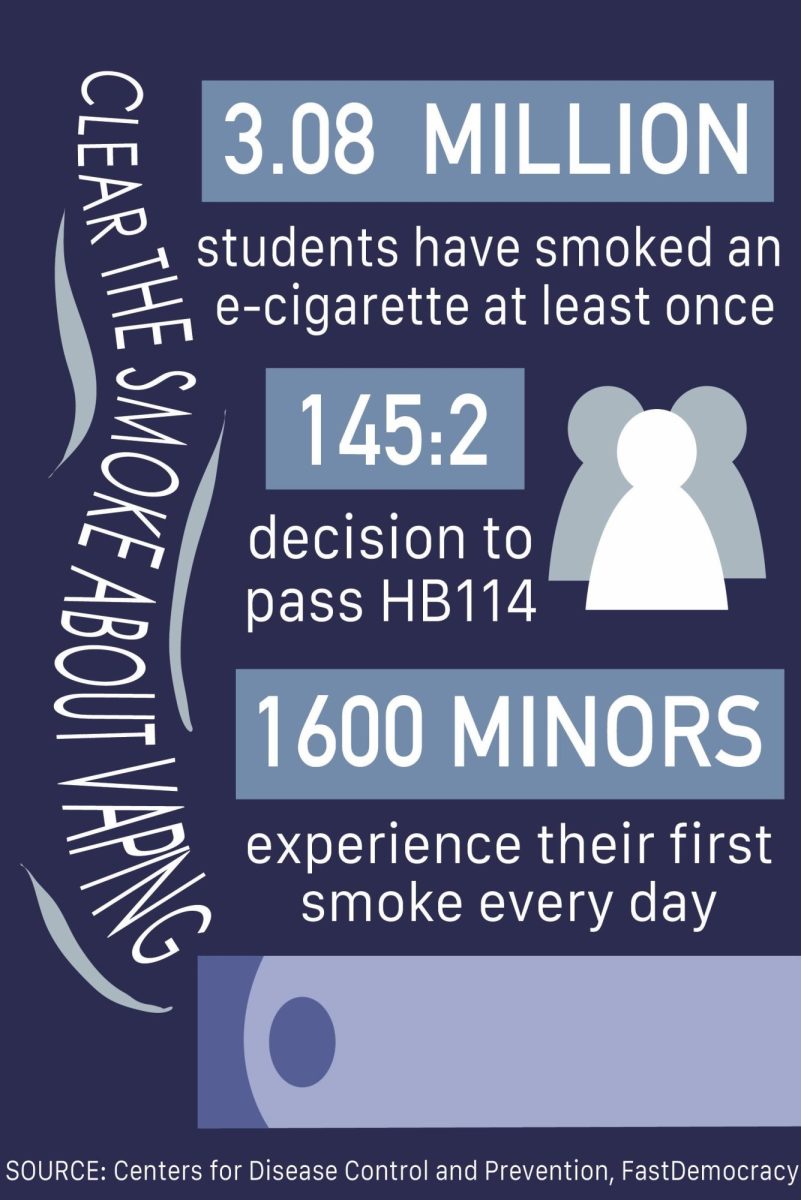An anonymous Coppell High School senior enters the bathroom. Attempting to find an unoccupied stall, she peers under the stall door when she noticed the stall to the far right.
Under it are four pairs of shoes.
She vividly remembers CHS Principal Laura Springer rushing in to get everyone out except for those in the far right stall.
“I got so scared,” she said. “I’ve been trying to avoid the bathroom after that.”
Although the situation was not confirmed to be a potential vaping case, crackdowns such as this often happen around the halls of Coppell High School. CHS Associate Principal Zane Porter took up several vapes in just a span of a week.
As vaping offenses are rampant amongst the youth with 13% of all Texas students in grades sixth through 12th reported having vaped, lawmakers across the nation have taken to the legislation to find effective curtailing measures. On March 31, Congress enabled the Food and Drug Administration to regulate synthetic nicotine products, but Congress has not been the only body to pass such legislation.
In order to combat growing vape offenses, Texas lawmakers passed House Bill 114 to have stricter discipline for students caught vaping or in possession of e-cigarettes during the May regular session. Among those disciplines are placing students in a mandatory alternative schooling location if found in possession of e-cigarettes, marijuana or tetrahydrate cannibal within 300 feet of school property on first offense. The bill went into effect in September.
A small beige building is nestled between Denton Creek Trail and N. Denton Tap Road. Through the glass doors of the office is a desk. Upon it are heaps of files, a large computer and a placard. The card reads Victory Place @ Coppell Principal Cynthia Osborne.
This is Victory Place.

The building consists of both the by-choice Alternative Education Program Turning Point and the Disciplinary Alternative Education Program Compass (DAEP). The latter has a capacity of 15 students.
“If you ask me, the bill can clog up school systems,” Porter said. “Not for our school at this moment, but it might.”
Following the bill’s passing, Coppell ISD students caught with e-cigarettes were to be placed at Compass, which is constantly at or over capacity given its small size.
“With the campus DAEP program being as small as it is and looking at how previously individuals faced three to five days in-school suspension based on your grade level, that seemed like a big jump,” Osborne said. “So, our District of Innovation put in some plans.”
On July 19, CISD Assistant Superintendent of Curriculum and Instruction Dr. Angie Brooks requested that the CISD Board of Trustees approve an amendment plan for the bill.
Within the drafted request, Dr. Brooks cited the fact that students continually being assigned to DAEP and transitioning back to his or her home campus requires a transition plan that the bill does not take into account. The lack of a transition plan can interrupt educational continuity.
The District of Innovations states that on first offense, students caught with an e-cigarette will be placed in in-school suspension on campus. The second offense of being in possession of an e-cigarette requires students to be placed in automatic DAEP for 45 days. If the DAEP is at capacity, however, a student that is already at the DAEP can go back to their original school in place of a student.
“We want our campus to be safe,” CISD Superintendent Dr. Brad Hunt said at the CISD Board of Trustees meeting on July 24. “We don’t want drugs and alcohol to be at school or school-related events. Vaping has been a concern of ours. But, we were concerned that this policy would require an elementary, middle or even high school student that has a first offense or just be holding a vape for someone to go right to DAEP. ”
Dr. Hunt also worried about the students’ ability to learn under these circumstances.
“I’m all about parent involvement and choice, but this to me is very counterproductive in trying to help kids learn,” Dr. Hunt said. “Yes, we want to be strict in these topics, but we definitely want to have our parents be a part of this process. When it’s so restrictive, there’s no wiggle room. We want to provide kids the opportunity to learn and grow.”
For CHS junior Justin Chang, the new policy can be effective.
“I feel like the policy is a respectable approach.” Chang said. “People shouldn’t be hooked onto [vaping] at a young age because that can kill you in the future. It’s effective since once you go, you’ll come back as a better person mentally and physically.”
Despite the potential to be at capacity, Osborne expects the current building will satisfy students that are placed in the DAEP program.
“We have multiple classrooms, so we might spread students across a couple of classrooms,” Osborne said. “As far as building on the building, I don’t see that happening anytime soon given the resources it would take.”

However, Osborne thinks there are other ways to solve the problem.
“As a nation and a state, we need to continue to educate our students on the hazards of using vapes,” Osborne said. “That will be the number one contributor to helping students not get into this situation proactively. For students that are addicted to nicotine, providing support is important to break the addiction. That is something we are continuing to look at within our system, but we do have a course that many of our learners take on the impacts of drugs and alcohol and what that does to them physically, mentally and to their families.”
Follow Anushree De (@anushree_night) and @CHSCampusNews on X.













